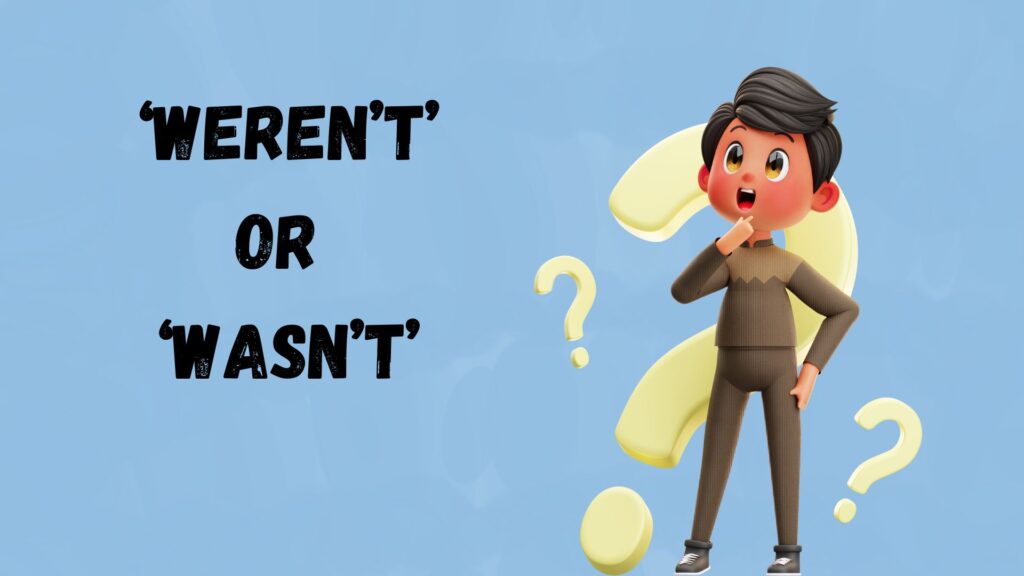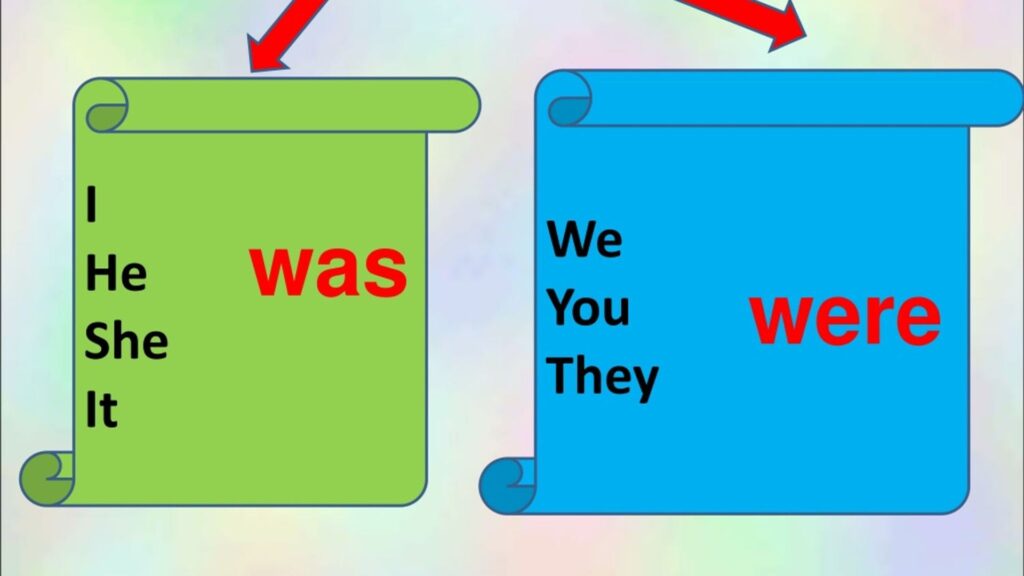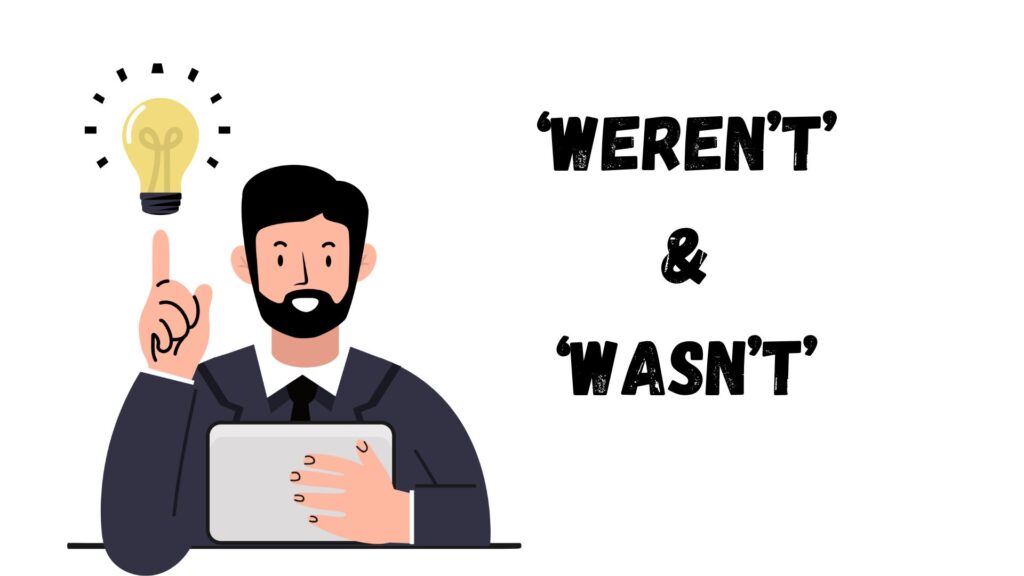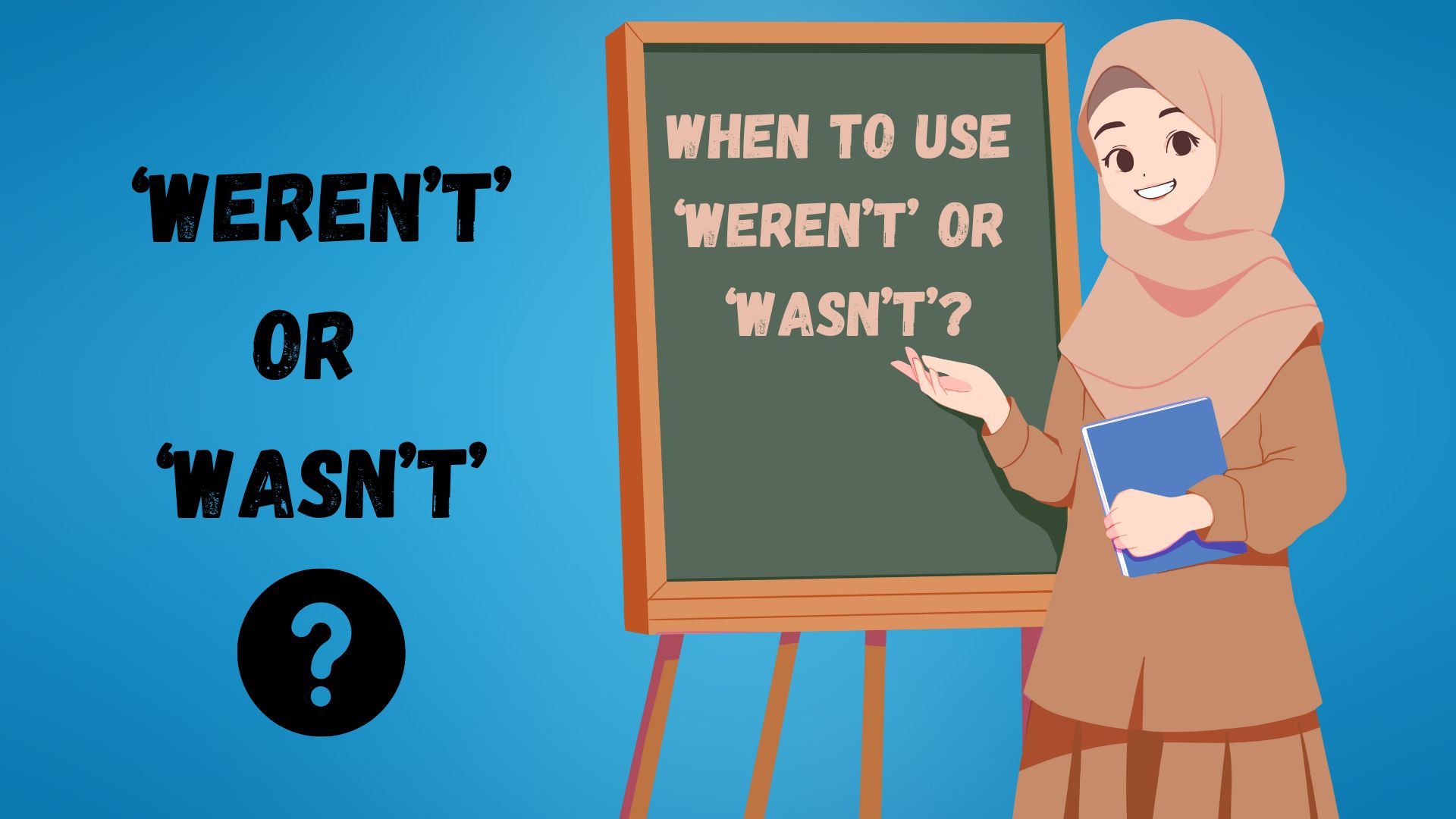Ever found yourself stuck wondering, “Should I say wasn’t or weren’t?” You’re not alone. These two little verbs cause a lot of confusion, even for native English speakers. Let’s clear the fog once and for all.
The Basics: What’s the Difference?

Both “wasn’t” and “weren’t” are contractions of the past tense of “to be.” They mean “was not” and “were not,” respectively.
| Contraction | Full Form | Used With |
|---|---|---|
| Wasn’t | Was not | Singular subjects (I, he, she, it) |
| Weren’t | Were not | Plural subjects (we, you, they) & Subjunctive mood |
At a glance, it’s all about subject-verb agreement but as you’ll see, the subjunctive mood throws a curveball.
When your subject is singular like “he,” “she,” “it,” or even “I” . Lou you’ll usually use “wasn’t.” Let’s look at a few cases.
✅ Correct Usage:
- I wasn’t aware of the deadline.
- He wasn’t at the meeting yesterday.
- The movie wasn’t as good as expected.
❌ Incorrect:
- They wasn’t prepared. → (Plural subject, wrong verb)
Use “Weren’t” for Plural Subjects (Past Tense)

When your subject is plural like “we,” “they,” or “you” you’ll want to use “weren’t.”
✅ Correct Usage:
- They weren’t convinced by the presentation.
- You weren’t on the guest list.
- The animals weren’t kept in cages.
❌ Incorrect:
- She weren’t feeling well. → (Singular subject, wrong verb)
Here’s Where It Gets Tricky: The Subjunctive Mood
Ah, the subjunctive mood that rare, often-overlooked cousin of standard verb tenses. It deals with hypothetical or unreal situations, wishes, or counterfactual statements.
And here’s the golden rule:
Use “weren’t” instead of “wasn’t” with singular subjects in the subjunctive.
This includes “I,” “he,” “she,” “it” even though they’re usually paired with “was.”
✅ Examples:
- If I weren’t so tired, I’d go to the gym.
- I wish I weren’t afraid of heights.
- If it weren’t for you, I’d still be stuck.
❌ Incorrect:
- If I wasn’t taller, I couldn’t reach the shelf. (Should be “weren’t”)
Why? Because we’re talking about something unreal or imagined, not a factual statement.
Real-World Example: Email Scenario
Let’s say Emma is writing to her boss after missing a team call:
Subject: Apologies for Missing the Meeting
Hi Daniel,
I sincerely apologize for missing today’s strategy session. I wasn’t feeling well this morning and didn’t want to risk spreading anything.
If it weren’t for this sudden flu, I would’ve been there on time and fully prepared. I’ve reviewed the meeting notes and will follow up with Sam for action items.
Best regards,
Emma
Notice the switch between “wasn’t” (fact: she felt sick) and “weren’t” (hypothetical: if she had been well). This is classic subjunctive mood usage.
Common Mistakes to Avoid
Even advanced learners sometimes slip up. Let’s tackle a few incorrect verb usage examples and fix them:
| Incorrect | Why It’s Wrong | Correct |
|---|---|---|
| If he wasn’t so lazy… | Subjunctive with singular subject | If he weren’t so lazy… |
| They wasn’t ready yet. | Plural subject mismatch | They weren’t ready yet. |
| The cat weren’t hungry. | “Cat” is singular | The cat wasn’t hungry. |
Quick Test: Can You Spot the Error?
Choose the correct sentence:
- If she wasn’t late, we’d already be there.
- If she weren’t late, we’d already be there.
✅ Answer: Sentence 2. “If she weren’t…” is correct because it’s a counterfactual she is late, so we’re imagining the opposite.
Memorable Trick to Remember

Use “wasn’t” when something actually didn’t happen (factual), and
Use “weren’t” when imagining a what-if world (hypothetical).
You might even say:
“If this article weren’t so helpful, you wouldn’t be reading it right now!” 😉
Key Phrases in Context
To deepen understanding, here’s how some commonly searched phrases fit into real-world usage:
- “Wasn’t it obvious?” Used for rhetorical emphasis with a singular subject.
- “Weren’t it for her quick thinking…” This is actually incorrect. It should be “If it weren’t for her quick thinking…”
- “I wasn’t aware…” Clear past fact.
- “They weren’t convinced…” Plural subject, factual.
- “If it weren’t for…” Hypothetical construction.
- “I wish I weren’t…” Counterfactual wish.
When Both Could Technically Work (But Don’t Mean the Same Thing)
Take this example:
- “If I wasn’t rude, I apologize.” → Here, you’re unsure if you were rude.
- “If I weren’t rude, I wouldn’t have said that.” → This implies you were rude and you’re reflecting on it hypothetically.
Subtle? Yes. But powerful. This shows how context and tone shape verb conjugation choices.
Wrap-Up: Key Takeaways
Let’s bring it home with a simple table summarizing the correct usage of wasn’t and weren’t:
| Usage Type | Use Wasn’t | Use Weren’t |
|---|---|---|
| Singular Subject | ✅ | ❌ |
| Plural Subject | ❌ | ✅ |
| Subjunctive Mood | ❌ | ✅ |
| Hypotheticals (If…) | ❌ | ✅ |
| Factual Statements | ✅ | ❌ |
Final Thoughts
Mastering the difference between “wasn’t” vs “weren’t” isn’t just about memorizing rules it’s about understanding how we express real vs imagined situations in English. By learning the distinction between factual past and the subjunctive mood, you’ll sound more polished, precise, and fluent.
Want to test yourself further? Try writing your own sentences using phrases like “If I weren’t,” “They weren’t,” or “It wasn’t.” You’ll get the hang of it in no time.

